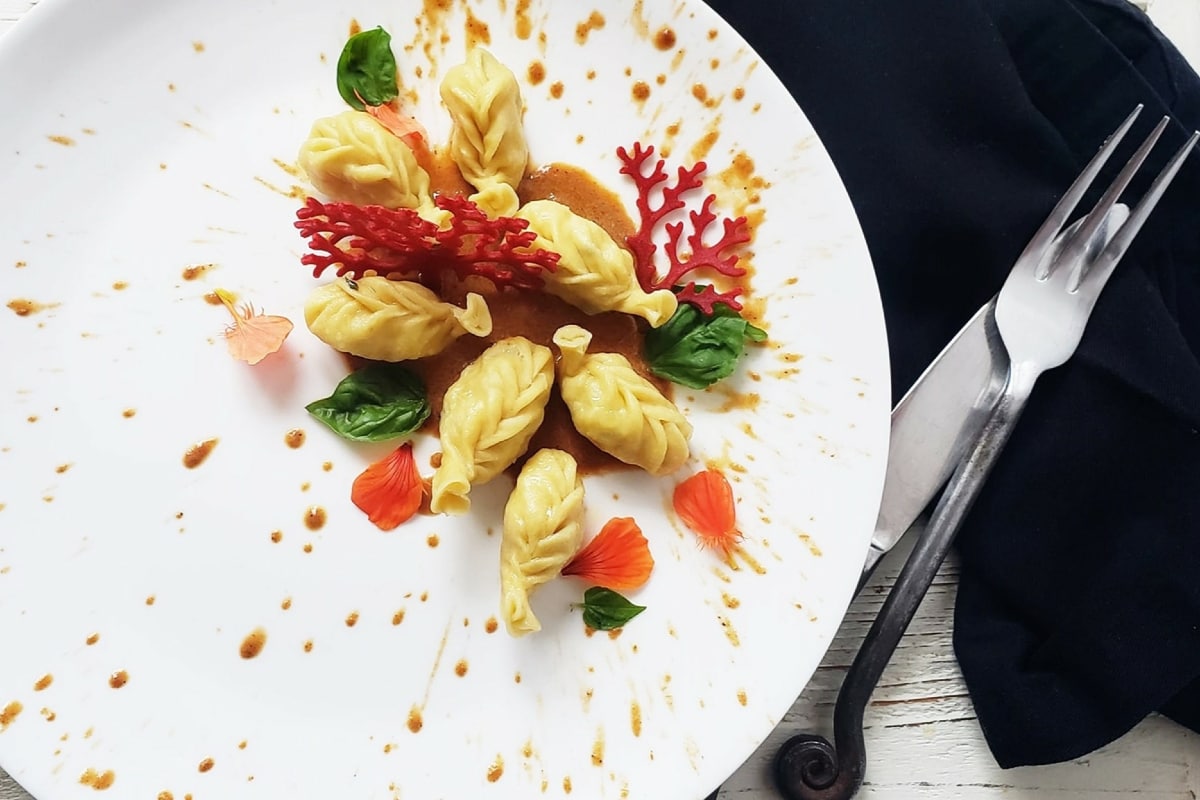Fish ravioli
- Difficult
- 1 h 20 min

Shrimp bisque and ravioli encapsulates the Italian spirit of frugality: making pasta with zero waste. The shrimps are used to fill the ravioli, while the shells are used for the bisque. Isn't it great?
It is a very rich and satisfying dish, so a little bit goes a long way. An average portion should always have uneven numbers (5 or 7) and the bisque is so rich that a ladle full shall suffice. Create this show stopper for Christmas or a special Sunday supper, your guests will love it!
Even though the preparation might look daunting, it can be done in steps: bisque, filling, pasta dough. All of them are fairly easy. As usual, follow the notes at the bottom of the recipe for further tips and deets.
You may also like:
First clean the shrimps:
Do not rinse them in water. Shrimps are very porous and a paper towel is all you need.
Remove the heads and discard the eyes (they tend to make a bitter bisque). Clean the shells and tails and place them in a clean bowl with the heads.
Using a pairing knife, score a cut on top of the shrimp, right in the middle, horizontally. This should expose the vein. Remove the dark vein with the tip of the knife, tweezers or a paper towel. Repeat with all the shrimps.
Set the shells aside for later (for the bisque).
Place the cleaned shrimps and the remaining ingredients in the bowl of a large food processor.
You can roughly chop everything up a little, to make it fit nicely in smaller appliances.
Pulse a few times until all ingredients have incorporated but not become a paste. Some larger pieces of shrimps should be visible.
Set aside in refrigerator, covered, until needed.
Place the flour on a flat surface and make a well (volcano) using a glass or your hand. In the center of the "crater" place the salt and the eggs.
OPTIONAL: you can add also one tablespoon of oil, for an easier to handle dough.
Using a fork, break down the egg yolks and beat the eggs incorporating some of the flour from the "volcano" slopes, all while being careful not to let the liquids escape.
Keep adding flour and transition to using your hands for kneading. Add water as needed to keep the dough elastic but not overly wet. Knead for about 15 to 20 minutes until the mass is smooth.
Cover it with an inverted bowl and let rest for about 30 minutes.
After the time has passed, roll out the pasta dough to about 2" thickness or less. Cut into squares or round shapes and fill with 1 teaspoon to 1 tablespoon of the shrimp mix.
Fold or close the ravioli as you desire. Set them aside on a cotton towel lined tray. Repeat until no dough or filling remains.
Refrigerate.
In a medium/large casserole, place the butter and the mirepoix (onion, carrot and celery mix), thyme and a pinch of salt. Sauté until the onion starts to sweat, about 8 minutes.
Deglaze with half of the vodka and reduce to almost evaporated.
Add the shells and stir. Cook 6 more minutes until they have turned pink/orange.
Now add the tomato paste and cook it until it turns a dark brick color. Stir over medium heat not to get any black sediments on the bottom of the pan.
After about 3 minutes add the garlic and the flour. Stir well.
Deglaze with the remaining vodka and cook 5 more minutes.
Measure 1 C of ice and stir it into the sauce: the thermal shock will help release more flavor from the shells and in general.
When the ice has melted add the water, the bay leaf and cinnamon. Stir well and let simmer over low heat for about 40 minutes until the bisque has almost a gravy consistency.
Strain the bisque through a fine mesh strainer. Press well against the mesh to extract all the juices and the pulp from the carrots (add sweetness).
Discard the solids. Incorporate the mascarpone to the bisque soup. Taste for salt and adjust.
Keep the bisque warm (above 140°).
Bring a medium pot of salted water to a boil, and lowering the heat, simmer the fresh ravioli for a few minutes until they come afloat and they are tender.
Spoon some bisque on a bowl or plate and top with some ravioli.
Garnish with edible flowers or parsley or basil.
Serve and eat at once.